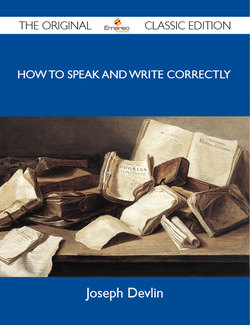Читать книгу How to Speak and Write Correctly - The Original Classic Edition - Devlin Joseph - Страница 16
На сайте Литреса книга снята с продажи.
Оглавление3rd person
He is loved
They are loved
PAST TENSE
Sing. Plural
1st person I was loved We were loved
2nd person You were loved You were loved
3rd person He was loved They were loved
FUTURE TENSE
Sing. Plural
1st person
I shall be loved
We shall be loved
2nd person
You will be loved
You will be loved
3rd person
He will be loved
They will be loved
PRESENT PERFECT TENSE
Sing. Plural
1st person I have been loved We have been loved
2nd person You have been loved You have been loved
3rd person He has been loved They have been loved
PAST PERFECT TENSE
Sing. Plural
1st person I had been loved We had been loved
2nd person You had been loved You had been loved
3rd person He had been loved They had been loved
FUTURE PERFECT TENSE
Sing. Plural
1st person
I shall have been loved
We shall have been loved
2nd person
You will have been loved
You will have been loved
3rd person
He will have been loved
They will have been loved
Imperative Mood
(PRESENT TENSE ONLY)
Sing. Plural
2nd person Be (you) loved Be (you) loved
Subjunctive Mood
PRESENT TENSE
Sing. Plural
1st person
If I be loved
If we be loved
2nd person
If you be loved
If you be loved
3rd person
If he be loved
If they be loved
PAST TENSE
Sing. Plural
1st person
If I were loved
If they were loved
2nd person
If you were loved
If you were loved
3rd person
If he were loved
If we were loved
PRESENT PERFECT TENSE
12
Sing. Plural
1st person If I have been loved If we have been loved
2nd person If you have been loved If you have been loved
3rd person If he has been lovedIf they have been loved
PAST PERFECT TENSE
Sing. Plural
1st person If I had been loved If we had been loved
2nd person If you had been loved If you had been loved
3rd person If he had been loved If they had been loved
INFINITIVES
Present Perfect
To be loved To have been loved
PARTICIPLES
Present Past
Perfect
Being loved
Been loved
Having been loved
(N. B.--Note that the plural form of the personal pronoun, you, is used in the second person singular throughout. The old form
thou, except in the conjugation of the verb "To Be," may be said to be obsolete. In the third person singular he is representative of the three personal pronouns of the third person, He, She and It.)
ADVERB
An adverb is a word which modifies a verb, an adjective or another adverb. Thus, in the example--"He writes well," the adverb shows the manner in which the writing is performed; in the examples--"He is remarkably diligent" and "He works very faithfully," the adverbs modify the adjective diligent and the other adverb faithfully by expressing the degree of diligence and faithfulness.
Adverbs are chiefly used to express in one word what would otherwise require two or more words; thus, There signifies in that place;
whence, from what place; usefully, in a useful manner.
Adverbs, like adjectives, are sometimes varied in their terminations to express comparison and different degrees of quality. Some adverbs form the comparative and superlative by adding er and est; as, soon, sooner, soonest.
Adverbs which end in ly are compared by prefixing more and most; as, nobly, more nobly, most nobly. A few adverbs are irregular in the formation of the comparative and superlative; as, well, better, best. PREPOSITION
A preposition connects words, clauses, and sentences together and shows the relation between them. "My hand is on the table"
shows relation between hand and table.
Prepositions are so called because they are generally placed before the words whose connection or relation with other words they point out.
CONJUNCTION
A conjunction joins words, clauses and sentences; as "John and James." "My father and mother have come, but I have not seen them."
The conjunctions in most general use are and, also; either, or; neither, nor; though, yet; but, however; for, that; because, since; there-
fore, wherefore, then; if, unless, lest.
INTERJECTION
An interjection is a word used to express some sudden emotion of the mind. Thus in the examples,--"Ah! there he comes; alas!
13
what shall I do?" ah, expresses surprise, and alas, distress.
Nouns, adjectives, verbs and adverbs become interjections when they are uttered as exclamations, as, nonsense! strange! hail! away!
